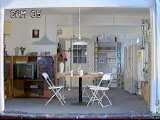|
Preparedness: At Home
These guidliness come from the
UC Berkeley Office of Emergency Preparedness.
|
This guide is primarily geared to earthquakes, but the planning you and your family do now will help when and if any disaster strikes. Remember: during a disaster, you will probably not be able to perform whatever tasks are required until you know that your family is safe. Take a moment now to make a plan.
See what happens to a typical
office or dining room during an earthquake.
More video and info on this
CUREE-Caltech Woodframe shake-table test.
| |

|
Preparation
Family Meetings
At least once a year, have a meeting with your family to discuss/update your plan and determine what training, equipment and supplies are needed. Occasional drills will assure quick reaction and avoid injury and panic in an emergency. Share your plans with neighbors, friends, relatives and co-workers.
Training
- How to protect yourselves from falling objects, smoke, fire, caustic fumes, etc.
- First Aid; Persons trained/Date; Location of Fist aid Kit
- How and Where to Shut off utilities
- Location of gas valve
- Location of wrench
- Location of main water valve
- Location of main circuit breaker
- Location of other utilities
- Draw a Plan of your Home: on a separate piece of paper, draw a floor plan of your home showing the location of exit windows (and doors, and utility shutoffs; First Aid Kit and emergency supplies; food, clothing, tools, etc). Be sure everyone in your household is familiar with the plan. Show it to babysitters and house guests when you’re going to be away. They could us it to direct someone to a utility shutoff in an emergency.
- Alternative places to meet near your home
- Alternative reunion locations when the family is not at home, e.g. home, Red Cross shelter, neighbors, relatives, park, school, etc.
- Name and telephone number of person outside area for family members to call to report location and condition.
- What is your child’s school or day care Disaster policy? Church? Club? Other? Are medical consent forms complete?
- Where are emergency supplies and equipment located (see also "Disaster Supplies for Home")?
Inspect your Home
- Secure water heater, refrigerator, tall and heavy furniture to wall studs.
- Move heavy items to lower shelves, below head height.
- Install clips, latches and other locking devices on cabinet doors.
- Provide strong support and flexible connections on gas appliances.
- Remove or isolate flammable materials.
During an Earthquake
- If you are indoors, get under a table or desk. Watch for falling, flying and sliding objects. Stay away from windows, which may shatter.
- If you are outdoors move to an open area away from buildings, trees, power poles, brick or black walls, and other objects that could fall.
- If you are in an automobile, stop and stay in it until the shaking stops. Avoid stopping near trees and power lines, on or under overpasses.
- If you are in a high rise building, get under a desk until the shaking stops. Do not use the elevator to evacuate—use the stairs.
- If you are in a store try to get under a table, or any sturdy object. Avoid stopping under anything that could fall. Do not run for the exit. Choose your exit carefully.
If you must Evacuate
- Prominently post a message indicating where you can be found.
- Take with you:
- Medicines and first aid kit
- Flashlight, radio and batteries
- Important papers and cash
- Food, sleeping bags, blankets and extra clothes
- Make arrangements for pets
After an Earthquake
- Wear heavy shoes to avoid injury from stepping on glass and other debris.
- Check for injuries, give first aid.
- Check for fires and fire hazards.
- Sniff for gas leaks, starting at the hot water heater. If you smell gas or suspect a leak, turn off gas at main valve, open windows, and carefully leave the house. Do not turn lights on or off or light matches, or anything that makes a spark. Note: do not shut off gas unless an emergency exists. It time permits call the gas company or a qualified plumber. Do not turn it back on until the gas company or plumber has checked it out. You could cause an explosion.
- Shut off water at main valve.
- If damage to electrical system is suspected (frayed wires, sparks, or smell of hot insulation) turn off system at main circuit breaker or fuse box.
- Check neighbors for injury.
- Turn on radio and listen for advisories. Locate light source, if necessary.
- Stay well clear of downed power lines or objects near downed wires.
- Clean up potentially harmful material.
- Check to see that sewage lines are intact before continued flushing of toilets.
- Check house, roof, and chimney for damage.
- Check emergency supplies.
- Do not use phone except for genuine emergencies.
- Do not go sightseeing.
- Be prepared for after shocks.
- Open closets and cupboards carefully.
- Cooperate with public safety officials. Be prepared to evacuate when necessary.
|

